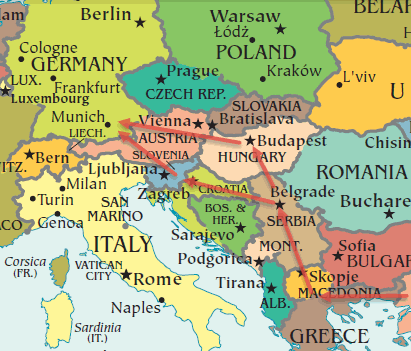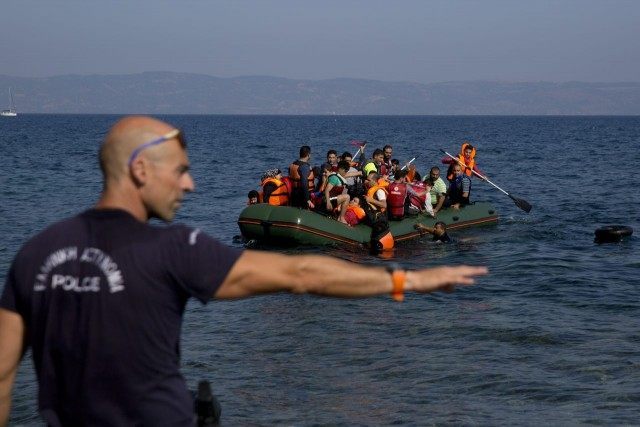This morning’s key headlines from GenerationalDynamics.com
- European countries in near-chaos take turns dumping migrants
- Russian ‘refusenik’ soldiers resist deployment in Syria
- Russia’s media take note of Carly Fiorina’s debate statements
European countries in near-chaos take turns dumping migrants

With the route through Hungary blocked, migrants and refugees have turned west, overwhelming Croatia
Thousands of migrants travel from Turkey to the Greek islands in the Aegean Sea. Greece ferries them to the Port of Piraeus, and then buses them to the border of Macedonia, and dumps them there.
Macedonia transports them to the border of Serbia, and dumps them there.
Formerly, Serbia transported all of them to the border with Hungary, and dumped them there.
However, Hungary has built a long fence, in order to block migrants from crossing from Serbia into Hungary.
So now, Serbia’s buses have been diverted, and now they’re dumping the migrants on Croatia’s border.
Croatia started busing them to the border with Slovenia, and dumping them there.
Slovenia is saying that it cannot handle all the migrants, and is closing its border to Croatia. Slovenian police used pepper spray to ward off hundreds of migrants.
But it is Croatia’s turn to be completely overwhelmed. Some 30,000 migrants are now in Croatia, and about 40,000 more are in Macedonia en route to Croatia.
Croatia is sending as many as it can to Slovenia, and is also diverting many of them east into Hungary, infuriating Hungary’s government, which sent armored vehicles to its border with Croatia to block the migrants.
Croatia’s prime minister, Zoran Milanovic, called Hungary’s actions “incomprehensible”, given that no refugee wanted to stay in Hungary, and said the situation was “the ugliest thing I have seen in Croatia since the [Balkans] war.” In response, Hungary’s foreign minister, Péter Szijjártó, said Croatia had “lied in the face” of Hungary.
Thousands of migrants are trapped at one border or another, or in a refugee camp in one of the countries.
From the point of view of Generational Dynamics, I have written many times in the last decade about the expected lineups in the approaching Clash of Civilizations world war — China plus Pakistan plus the Sunni Muslim countries plus others versus the West plus India plus Russia plus Iran. As I have mentioned many times recently, this lineup seemed fantastical when I first described it a decade ago, but in the last couple of years it has been the trend.
However, the generational analysis methodology has never given me a clear trend for how the different European countries will fit into this lineup. One possibility is that Germany and France will lead opposing factions, as they have so often in past centuries, along the Protestant versus Catholic fault line. During the worst of Greece’s financial crisis, I was watching to see if a substantial north versus south fault line would develop, although that seems to have subsided for the time being. This new refugee crisis, the worst since World War II, seems to be trending into an east versus west fault line. As winter approaches, and the stream of migrants slows down, the important thing to watch will be whether the refugee crisis subsides, or turns into something worse by spring. Perhaps it wouldn’t be too far off to say that Europe’s fate in the next year depends on Syria. Budapest Times and Guardian (London)
Russian ‘refusenik’ soldiers resist deployment in Syria
Evidence is mounting that Russia is sending its most capable combat forces and most advanced weapons systems to Syria. Some reports indicate that Russian troops are already engaged in combat.
Russia’s evident purpose is to link up with Iranian troops in Syria, and to shore up Syria’s president Bashar al-Assad. New estimates include that ISIS has 20,000 foreign troops, with 3,400 from Western Europe, and more than 5,000 from Russia and Central Asia.
As I wrote last week in “13-Sep-15 World View — Russia opens a dangerous new chapter in Syria and the Mideast,” Russia’s military deployment is going to trigger nationalistic and belligerent responses from Saudi Arabia and other Gulf nations, from terrorists in al-Qaeda linked Jabhat al-Nusra (al-Nusra Front) and the so-called Islamic State (IS or ISIS or ISIL or Daesh), and from the Recep Tayyip Erdogan government of Turkey. All of these groups consider al-Assad and Iran to be existential threats.
However, reports are emerging that soldiers in Russia are being commanded to go to an unknown destination, without being told that it’s Syria, but that many of them have figured it out and are refusing to go. According to one soldier interviewed by Gazeta.ru:
We had a conversation in the unit to our command. We were told that in the country of arrival will be hot and what’s important to remember about hygiene and in any case do not step outside the territory of the military unit, also explained what to do and how to behave in captivity and interrogation, – told the soldiers. – We are specifically told that the climate will unusual for us: snakes, vipers. But where specifically we were being sent, did not say, citing the secret directive of the General Staff.
The wife of one such soldier was interviewed was expressing outrage: “Why are people driven there like cattle to the slaughter? We do not want war.”
US Secretary of State John Kerry made a new hard-hitting statement on the subject: “Clearly, the presence of aircraft with air-to-air combat capacity as well as … surface-to-air missiles raises serious questions.”
Russian state media is mocking Obama’s “fumbling” in the face of Putin’s “consistency”: “It is increasingly difficult to watch the most recent coverage of the Syrian war and not be struck by how utterly illogical and convoluted it has become. But look through the media spin and it’s clear: the Russian leader’s steady moves in Syria is perplexing the US.” RFERL and Gazeta.ru (Trans) and CNN and Debka and Russia Today
Russia’s media take note of Carly Fiorina’s debate statements
Although everything that American presidential candidates say is undoubted of great interest to Russian media, they’ve been taking particular notice of a statement by Carly Fiorina at last week’s Republican debate.
Fiorina was asked, “You’ve met Vladimir Putin, yes?”, and she responded:
Having met Vladimir Putin, I wouldn’t talk to him at all. We’ve talked way too much to him.
What I would do, immediately, is begin rebuilding the Sixth Fleet, I would begin rebuilding the missile defense program in Poland, I would conduct regular, aggressive military exercises in the Baltic states. I’d probably send a few thousand more troops into Germany. Vladimir Putin would get the message. By the way, the reason it is so critically important that every one of us know General Suleimani’s name is because Russia is in Syria right now, because the head of the Quds force traveled to Russia and talked Vladimir Putin into aligning themselves with Iran and Syria to prop up Bashar al-Assad.
Russia is a bad actor, but Vladimir Putin is someone we should not talk to, because the only way he will stop is to sense strength and resolve on the other side, and we have all of that within our control.
We could rebuild the Sixth Fleet. I will. We haven’t. We could rebuild the missile defense program. We haven’t. I will. We could also, to Senator Rubio’s point, give the Egyptians what they’ve asked for, which is intelligence.
The specifics of Fiorina’s statement have to be debated, but this may well be the most coherent statement made by anyone at the debate. Sputnik News (Moscow) and Washington Post
KEYS: Generational Dynamics, Greece, Macedonia, Serbia, Hungary, Croatia, Slovenia, Austria, Germany, Zoran Milanovic, Péter Szijjártó, Russia, Syria, Bashar al-Assad, refuseniks, John Kerry, Vladimir Putin, Carly Fiorina
Permanent web link to this article
Receive daily World View columns by e-mail

COMMENTS
Please let us know if you're having issues with commenting.